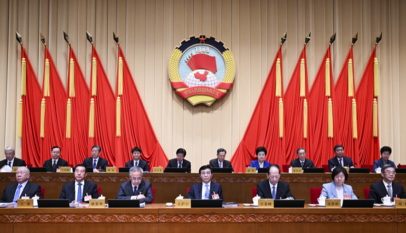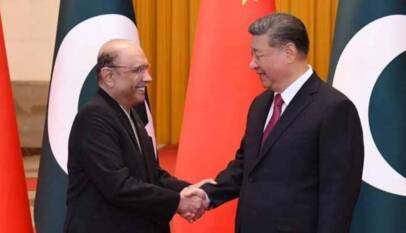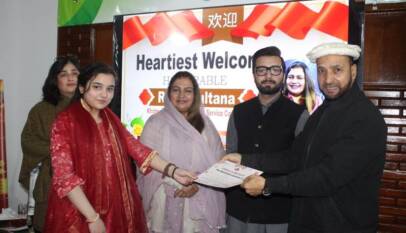South Asian nations laud China’s role in fighting covid 19, poverty alleviation
During a virtual conference, China, Pakistan, Afghanistan, Nepal, Sri Lanka and Bangladesh have agreed to establish a centre for cooperation on poverty reduction and development, as well as hold a forum on cooperation in e-commerce-driven poverty reduction in rural areas. While chairing the meeting, State Councillor and Foreign Minister Wang Yi made a four-point proposal, urging countries to enhance solidarity in the virus fight; deepen pragmatic anti-virus cooperation; promote post-pandemic recovery; and secure circumstances for enabling countries’ growth. The five neighbours hailed China’s efforts in boosting the accessibility and affordability of vaccines in developing countries.
BEIJING: As a major step in the joint fight against Covid-19 and efforts to boost economic recovery, China and five of its South Asian neighbours have agreed to build an emergency supplies reserve.
China, Afghanistan, Pakistan, Nepal, Sri Lanka and Bangladesh also agreed to establish a centre for cooperation on poverty reduction and development, as well as hold a forum on cooperation in e-commerce-driven poverty reduction in rural areas.
The agreements came at a videoconference bringing together the six nations’ foreign ministers to discuss how to further tackle the pandemic, according to local media reports.
They met via video link at a time when South Asia is faced with another resurgence of COVID-19 infections amid growing concerns over a shortage of vaccines and medical supplies.
While chairing the meeting, State Councillor and Foreign Minister Wang Yi made a four-point proposal, urging countries to enhance solidarity in the virus fight; deepen pragmatic anti-virus cooperation; promote post-pandemic recovery; and secure circumstances for enabling countries’ growth.
The other five foreign ministers voiced support for Wang’s proposal and thanked China for offering material and technical assistance to various countries fighting the virus.
They reiterated their countries’ support for the World Health Organization continuing to play an active role in global anti-epidemic cooperation, and they opposed politicizing the pandemic.
Vaccination disparities were highlighted at the meeting, and the ministers said vaccines should not be monopolized by a small number of countries, and vaccine distribution should be based on fairness.
The five neighbours hailed China’s efforts in boosting the accessibility and affordability of vaccines in developing countries.
When concluding the meeting, Wang said all the countries object to unilateralist bullying and interference in other nations’ internal affairs.
If power politics continues to prevail, developing countries and small and medium-sized nations “will first fall prey” to it, and ordinary people in various countries will suffer first, Wang warned, adding that China will stand up to support justice and boycott interference and moves that coerce countries to choose sides.
At the meeting, the six nations agreed to closely track variants of the virus and discuss multiple ways for further collaboration to achieve an early victory over the virus.
To bring about economic recovery, they agreed to better protect people who are vulnerable to the economic impact, advance the co-building of the Belt and Road, keep afloat the production and supply chains, facilitate travel and shipments, and explore teamwork in the digital economy.
India had also been invited to the meeting amid the country’s struggle with a deadly second wave of the virus, and Wang said China would like to express its sympathy to India and sincere greetings to its people.
Beijing is willing and available at any time to provide support and help to the people of India in accordance with India’s needs, he added.
Similar meetings among these countries have been held since the pandemic’s outbreak, such as the four-nation foreign ministers’ videoconference of China, Afghanistan, Pakistan and Nepal on COVID-19 in July.
By hosting Tuesday’s meeting, China “aims to manifest the region’s joint force in combating the virus, further advance cooperation for their virus fight, facilitate economic recovery and secure the public’s livelihoods”, said Chinese Foreign Ministry spokesman Wang Wenbin.
The meeting is “a natural part of global and regional efforts in fighting the virus”, Wang told reporters, and “other nations in the region are welcome to participate”, as the meetings have always pursued inclusiveness and win-win collaboration.
Meanwhie, the foreign ministers of Pakistan, China, Bangladesh, Afghanistan, Nepal and Sri Lanka have agreed upon distribution of Covid-19 vaccine in accordance with the “principle of equity and justice”.
Terming the vaccine as “key weapon to defeat Covid-19”, the foreign ministers expressed that “vaccine nationalism” would hinder the global efforts to defeat the pandemic and underscored the need to avoid the “immunity gap”.
In a joint statement issued on Wednesday by the Foreign Office, the foreign ministers held a video conference on joint response to Covid-19, and exchanged views on international and regional cooperation on pandemic response and post-Covid economic recovery.
Foreign Ministers noted with satisfaction the concerted and productive efforts made by their countries since the start of Covid-19 to combat the virus and promote economic recovery in the spirit of overcoming challenges through cooperation and mutual assistance.
Foreign Ministers pointed out that Covid-19 was a common enemy of humankind, and that countries should step up solidarity and cooperation to win the final victory over it.
China expressed its readiness to provide continued medical supplies and technical assistance to participating countries to the best of its ability. Chinese initiative was appreciated.
Foreign Ministers reiterated their firm support to WHO’s due role in the global cooperation against Covid-19 and acknowledged that tracing the origin of the virus is a matter of science and a global mission.
Foreign Ministers expressed opposition to politicizing the issue and vowed that the participating countries would strengthen cooperation to track Covid-19 mutation closely.
They appreciated China’s efforts in addressing this challenge. China would act on President Xi Jinping’s important statement on making the vaccines a global public good, and carry out continued vaccine cooperation with the participating countries in a flexible manner, including co-production of Covid-19 vaccines.
They also recognized the serious impact of Covid-19 on the global economy and its complex implications for the sustainable development of all countries.
Foreign Ministers agreed to deepen Belt and Road cooperation, open their borders under the premise of pandemic prevention and control for smooth trade, keep the industrial and supply chains stable and secure, and give a stronger boost to economic recovery and the improvement of people’s lives.
China agreed to support the participating countries to overcome the impact of Covid-19 on their economies through enhanced level of economic cooperation and collaboration.
Foreign Ministers stressed the importance to strengthen cooperation in poverty reduction, food security and other non-traditional security fields to protect the livelihood of people with special attention to the most vulnerable groups.
To facilitate personnel exchanges against the backdrop of Covid-19, they agreed to discuss the possibility of mutual recognition of digital “health codes”.
To push forward practical cooperation in relevant fields, China announced its decision to establish a China-South Asian Countries Emergency Supplies Reserve, set up a China-South Asian Countries Poverty Alleviation and Cooperative Development Centre, and hold a China-South Asian Countries E-commerce Cooperation Forum on Poverty Alleviation in Rural Areas.
The other participating countries expressed support. The Foreign Ministers agreed to make these mechanisms inclusive, transparent, sustainable and demand-driven.
Foreign Ministers agreed to closely follow the development of Covid-19 situation in India, and expressed their willingness to provide needed support through respective channels in consultation with India.
They agreed to maintain the momentum of cooperation among the six countries, hold consultations at the Foreign Minister, Vice Foreign Minister/Secretary and Director General levels, expand cooperation areas and lend impetus to future cooperation.
In addition, in a spirit of openness, inclusiveness and win-win cooperation, the six countries welcomed active participation of other countries in the region.
China’s top political advisory body to hold annual session from March 4 to 10
ISLAMABAD, Mar 3 (APP): China’s Two Sessions, the annual gatherings of the National People…













